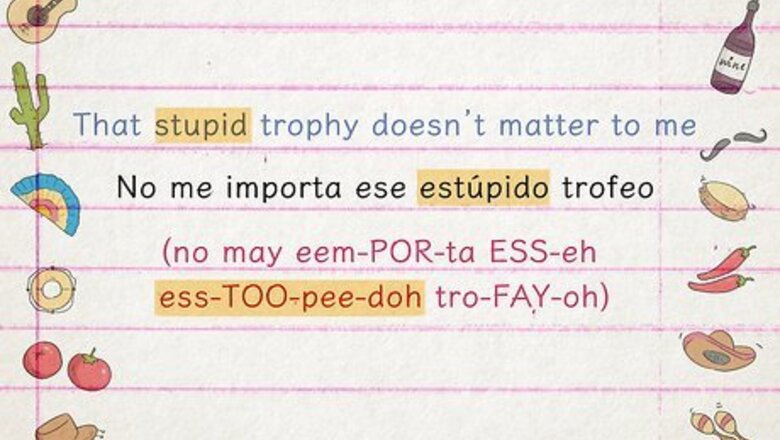
views
Estúpido (ess-TOO-pee-doh)
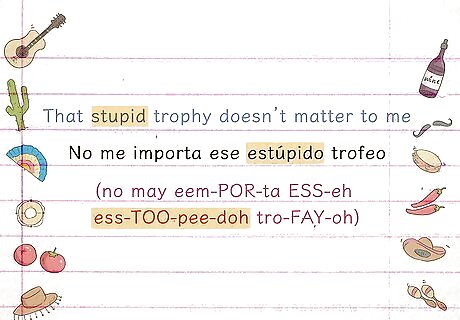
This is the standard translation of “stupid.” It has a similar level of offensiveness as its English counterpart, meaning you should be careful when using it to describe people who aren’t close friends that can take a joke. “Estúpido” is an adjective, which in Spanish means that it changes form depending on the gender of the noun it’s describing. When describing a male noun, use “estúpido,” and for female nouns, use “estúpida.” “No me importa ese estúpido trofeo.” (no may eem-POR-ta ESS-eh ess-TOO-pee-doh tro-FAY-oh): “That stupid trophy doesn’t matter to me.” “Ana no es estúpida como aparenta.” (AN-a no ess ess-TOO-pee-dah COH-mo ap-ah-REN-tah): “Anna isn’t as stupid as she seems.”
Idiota (eed-ee-OH-tah)
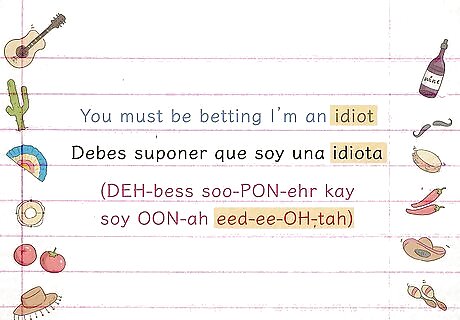
This words means what it sounds like in English: “idiot.” If you’re driving in a busy Spanish-speaking city, you might hear this word shouted out of windows by angry drivers. Calling someone an “idiota” can be quite offensive, so use it carefully. As a noun, “idiota” can refer to either a male or female. Adjectives and articles describing this noun can give a clue as to its gender: “un idiota” (oon eed-ee-OH-tah) means “an idiot (male)” and “una idiota” (OON-ah eed-ee-OH-tah) means “an idiot (female).” “Debes suponer que soy una idiota.” (DEH-bess soo-PON-ehr kay soy OON-ah eed-ee-OH-tah): “You must be betting I’m an idiot.” “Ese doctor es un idiota” (ESS-eh doc-TOR ess oon eed-ee-OH-tah): “That doctor is an idiot.”
Imbécil (eem-BAY-seel)
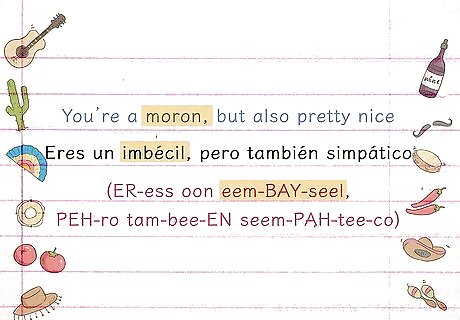
This word directly translates to “imbecile” or “moron.” Like its English equivalents, it’s quite offensive, so be careful when using it. Although you might be able to get away with using it in an affectionate way, this would likely only work if you’re very close to the person you’re talking to. “Eres un imbécil, pero también simpático.” (ER-ess oon eem-BAY-seel, PEH-ro tam-bee-EN seem-PAH-tee-co): “You’re a moron, but also pretty nice.” “Llevo tres horas esperando como un imbécil.” (YE-vo tray-ss OR-ahs CO-mo oon eem-BAY-seel): “I’ve been waiting three hours like a moron.”
Tonto (TAWN-toh)

This Spanish word directly translates into “fool.” This is one of the less offensive ways to call someone stupid in Spanish, and is often used in an affectionate way. This word can be used as either an adjective or as a noun—in either case, the masculine form is “tonto,” and the feminine form is “tonta.” “Creo que me veo tonto.” (CRAY-oh kay may VAY-oh TAWN-toh): “I think that I look foolish.” “Serias una tonta si no aceptaras.” (“ser-EE-ahs OON-ah TAWN-tah see no asep-TAR-ahs): “You’d be a fool if you don’t accept.”
Bobo (BO-bo)
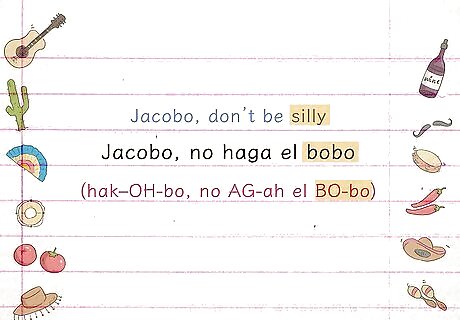
This is an affectionate term, similar to the English word “dummy.” If someone calls you a “bobo,” they usually don’t mean to hurt your feelings. This is a safe option to use if you want to lightly poke fun at someone’s intelligence without being offensive. “Jacobo, no haga el bobo.” (hak–OH-bo, no AG-ah el BO-bo): “Jacobo, don’t be silly.” “Soy un bobo, como tú.” (soy oon BO-bo, CO-mo too): “I’m a dummy, like you.”
Lelo (LAY-loh)
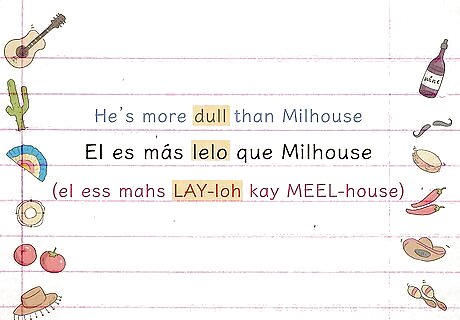
This is a mildly offensive term for someone who’s “thick” or “dull.” It can also be used to mean “stunned,” as in “Quede lelo” (KAY-day LAY-loh), or “I was stunned.” Saying this word to refer to someone who isn’t very smart is also an acceptable usage, however. “El es más lelo que Milhouse.” (el ess mahs LAY-loh kay MEEL-house): “He’s more dull than Milhouse.” “Dudo que me ascendieran porque me creían un lelo.” (doo-doh kay may ahs-send-ee-ER-an por-KAY may cray-EE-an oon LAY-lo): “I doubt that they promoted me because they thought I was dumb.”
Menso (MEN-soh)

This is a Latin American term for “stupid.” It’s particularly popular in Mexico, but if you use this word, people across Latin America should be able to understand you. This word’s offensiveness depends on your tone: it can mean “stupid” if you say it in a serious way, but “silly” if you use a lighter tone. “No seas menso.” (no SAY-ahs MEN-soh): “Don’t be stupid.” “¡Qué menso eres!” (kay MEN-soh EHR-ess): “You’re so silly!”
Tarado (tar-AH-doh)
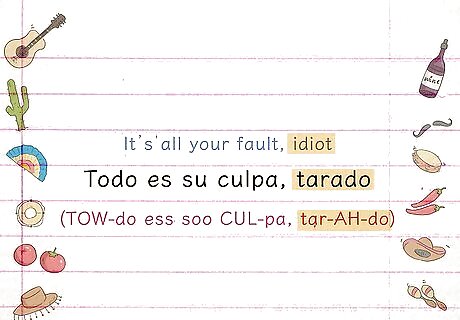
This is a term for a stupid person in Argentina, Chile, and Uruguay. In English, it literally translates to a slur for people with mental disabilities. You may also encounter this word in other Spanish-speaking countries, but it’s most commonly used in South America. “Todo es su culpa, tarado.” (TOW-do ess soo CUL-pa, tar-AH-do): “It’s all your fault, idiot.” “Si, puedes que seas un tarado, pero eres nuestro tarado.” (see, pu-EH-dess kay SAY-ahs oon tar-AH-doh, PEH-ro EHR-ess noo-ESS-tro tar-AH-do): “Yeah, you can be a dummy, but you’re our dummy.”
Mentecato (men-tay-CA-toh)
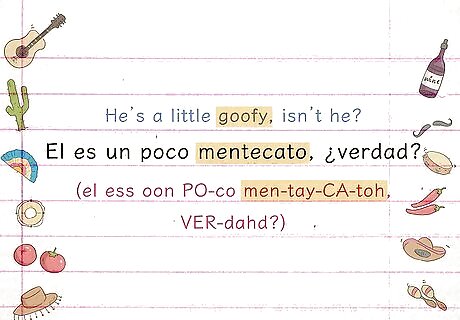
This word means “foolish” or “goofy” in countries like Spain and Venezuela. It’s similar to “tonto” in its offensiveness, meaning that it’s often used in an affectionate way. If you’re looking for a less hurtful way of poking fun at someone, try this word out. “El es un poco mentecato, ¿verdad?” (el ess oon PO-co men-tay-CA-toh, VER-dahd?): “He’s a little goofy, isn’t he?” “Don Quijote no es el mentecato que pretende ser.” (don key-HO-tay/key-SHO-tay no ess el men-tay-CA-toh kay pre-TEN-day sehr): “Don Quixote is not the fool he pretends to be.”
Güey (WEY)
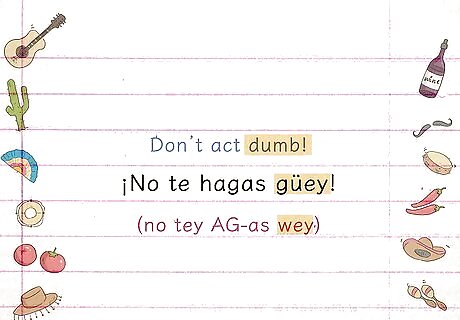
This is the Mexican Spanish equivalent of “dude” in American English. However, it does get used to mean “stupid” quite often. Like “dude” in American English, “güey” is a very common way for men to refer to each other. By using it in certain sentences, however, it’s a light, affectionate way of calling someone a dummy. “¡Qué güey!” (KAY wey): “What an idiot!” “¡No te hagas güey!” (no tey AG-as wey): “Don’t act dumb!”
Pendejo (pen-DAY-ho)
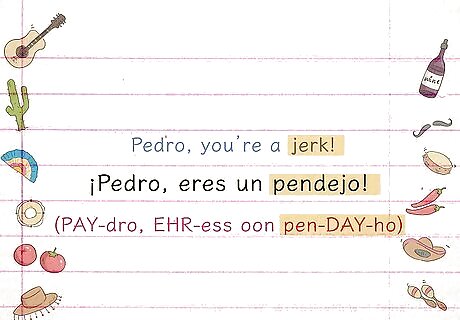
“Pendejo” is considered mild profanity, and literally means “pubic hair.” However, it’s more commonly used to mean “stupid person” or an English curse word for “jerk.” Although this word can be used affectionately between friends, since it is technically a Spanish curse word, try to stay away from using it with people you don’t know too well. “¡Pedro, eres un pendejo!” (PAY-dro, EHR-ess oon pen-DAY-ho): “Pedro, you’re an jerk!” “Nadie crees que eres un pendejo.” (NAH-di-eh CRAY-ess kay ER-ess oon pen-DAY-ho): “Nobody thinks you’re a jerk.”


















Comments
0 comment